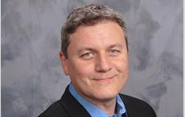Andre Levchenko Named A Fellow of the American Physical Society

Andre Levchenko, John C. Malone Professor of Biomedical Engineering, has been named a fellow of the American Physical Society.
 Levchenko, who also serves as director of the Systems Biology Institute at West Campus, combines experimental results with computational models to learn about the interactions of proteins and cells in healthy and disease states. The APS, the world’s largest organization of physicists, cited Levchenko’s “pioneering experimental and theoretical studies of cellular regulatory systems, and especially for elucidating chemical and mechanical mechanisms of guidance and control of cellular motility.” Levchenko, who came to Yale in 2013, combines experimental results with computational models to learn about the interactions of proteins and cells in healthy and disease states.
Levchenko, who also serves as director of the Systems Biology Institute at West Campus, combines experimental results with computational models to learn about the interactions of proteins and cells in healthy and disease states. The APS, the world’s largest organization of physicists, cited Levchenko’s “pioneering experimental and theoretical studies of cellular regulatory systems, and especially for elucidating chemical and mechanical mechanisms of guidance and control of cellular motility.” Levchenko, who came to Yale in 2013, combines experimental results with computational models to learn about the interactions of proteins and cells in healthy and disease states.
Levchenko, who will be formally inducted at the society’s annual meeting in March, said he was very honored - and also a little surprised.
“I would not necessarily classify myself as a physicist, but I would probably not classify myself as anything else,” he said. “The approach we’re taking is highly interdisciplinary.”
Levchenko’s lab has been working toward understanding how cells navigate in complex environments, and how they react to multiple cues. “It’s like a big puzzle and cells seem to know where they need to go, or how they need to connect with each other,” he said. “And when you try to understand that, it can be very complicated because they can be guided by a multitude of cues.”
His lab has proposed a series of mathematical models to explain how cells sense different soluble molecules, which can take many forms, such as growth factors of those that activate the immune response. These models have been validated by numerous experiments and have become standard in the field.
One of the mysteries they’re looking at is how cells can be exposed to many cues at the same time, and still “know” where they’re supposed to go.
“It implies the ability to make somewhat complicated decisions. That these very basic units of our bodies can have such sophisticated behaviors is something that has very much surprised us, along with many other researchers. They’re like little universes in themselves.”
Figuring out how cells navigate through complex terrains is important to understanding how our brains are wired, how our immune systems work, and also for a better understanding of cancer and other diseases. “Our institute is beginning to focus very seriously as a whole on the question of this very aggressive behavior by cancer cells, and where they will invade the tissues that surround them,” he said. “It’s a very complex task, which requires cells to be very ‘smart’ to accomplish.”
Understanding these very complex systems, Levchenko said, “requires all the power of physics” – that’s why the Systems Biology Institute is currently collaborating with researchers in the Physics Department. “We want to bring in different perspectives to compliment our existing strengths in genetics, paying attention as much to the physical components of the processes. To introduce that perspective would be a great service to biology.”
He said it’s another sign that the distinctions between certain disciplines are blurring, which is something that can also be seen in APS membership. Levchenko said the APS started out as a small group of physicists in the 19th century. Excitement about nuclear and quantum physics in the mid-20th century sparked a good deal of growth in the society. “Now I think it’s going through a very similar growth phase, in part, because of the new frontiers presented by biology. It’s very exciting to be a part of it.”

